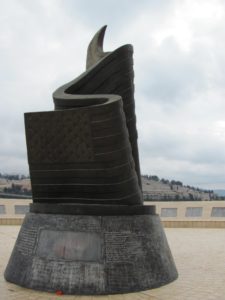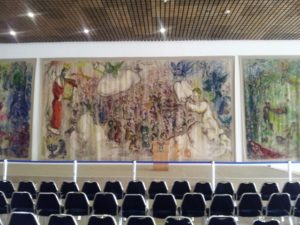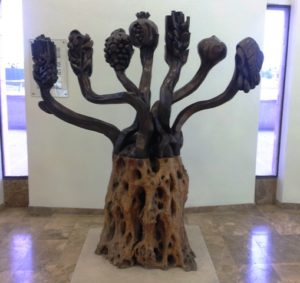Parashat Ekev holds an interesting claim. It says that it is acceptable to worship God and fulfill his commandments while hoping for some kind of a reward. One does not become a lesser Jew if he observes the commandments in order to gain some profit or avoid any kind of damage that might otherwise be caused by God. This idea can be found in the following part of the Parasha:
” And it shall come to pass, if you shall hearken diligently unto My commandments which I command you this day, to love the lord your God, and to serve Him with all your heart and with all your soul, that I will give the rain of your land in its season, the former rain and the latter rain, that you mayest gather in your corn, and your wine, and your oil“. (Deuteronomy 11, 13-14)
These words are part of the “Shma” prayer and can also be found in Mezuzahs and Tefillin, which means that they are an important part of Jewish daily life for thousands of years. Many Rabbis, and Maimonides amongst them, when interpreting the Mishna have noticed the contradiction between these words and the words of Parashat Shma that commands us “And you shall love the lord your God with all your heart, and with all your soul, and with all your might” (Deuteronomy 6,5).
This is a demand for a pure love of God, a love that does not expect anything in return. Apparently both ways are acceptable by Judaism maybe because of the belief that even if it is not intended, a good believer might come out of someone who only observes commandments without loving God.
Among other rewards that God promises his people if they only observe his commandments and follow his ways are: ” For the lord your God brings you into a good land, a land of brooks of water, of fountains and depths, springing forth in valleys and hills; a land of wheat and barley, and vines and fig-trees and pomegranates; a land of olive-trees and honey;” (Deuteronomy 8, 7-8).
According to this verse, Moses who says these words while they are about to cross the Jordan River and conquer the promised land they yearned for more than forty years in the desert, promises the Israelites a fertile land if only they observe Gods commandments. A land is considered fertile if it gives us the seven species mentioned in the above verse. When we read Honey in this specific place it means dates.
For many generations Jewish artists referred to the seven species that symbolize the fertility of the land. Many synagogues around the world have pictures and frescoes of the seven species. Some people put a reminder for the seven species in their Succa and others eat them in Tu Bishvat ( the 15th day in the Jewish month of Shvat – a Jewish holiday that is known as New year of the trees). This last practice that goes back to the days of Isaac Luria – Ha’ari – is the one that links us to a small tour in Jerusalem with Parashat Ekev in mind.
Tu Bishvat is also an important holiday for the Israeli parliament – The Knesset. In Tu Bishvat 1949, after a most exciting election campaign, the Knesset assembled for the first time. Since then Tu Bishvat is considered the birthday of the Knesset and is accompanied with a festive assembly and media reports. In Tu Bishvat 1999 the Knesset became 50 years old. The philanthropists of the Jewish national fund (Keren Kayemet) decided to dedicate a splendid gift for the Knesset – a statue of the Menorah which is made of the seven species. The Menorah is actually an olive tree from which all other species sprout. The pedestals of the Menorah look like the pedestals in the Menorah of the Temple and the symbol of the state of Israel. This statue was made by the artist Eliezer Weishoff a master artist of numerous fine art disciplines, who was born in Machane Yehoda neighborhood in Jerusalem and graduated from the Bezalel Academy of Arts and Design. In the early 1960’s Weishoff started to design postal stamps and coins and created statues and drawings. Several of his works are displayed in Jerusalem. Among them are the September 11 memorial that was erected in 2009 in the cedar forest and the stamps of “the gates of Jerusalem” that was printed in 1972.
The Israeli Knesset hosts many fine works of art, for example the amazing tapestries by the Jewish artist Mark Chagall in the welcome hall and the impressive gates made by David Polombo. The decoration of the Knesset was not an easy task. The architect Joseph Klarwein was constantly arguing with the internal decorator Dora Gad. This was another setback in the schedule of building the Knesset. The Knesset was first assembled in a house in the center of Jerusalem ( Frumin house in King George street) the location was obviously a bad choice and in 1954 it was decided to move the Knesst to Giv’at Ram where other government offices and the supreme court where supposed to be built. It took Klarwein twelve years to tackle all obstacles and accomplish the mission.
The Knesset building changes constantly. The chairman of the Knesset has the authority to add or remove any work of art. During the time of the 14th Knesset Dan Tichon, the chairman decided to add the Menora of seven species statue to the Knesset.
Weishoffs work connects Parashat Ekev from the bible with Tu Bishvat and the Knesset and can still be found in the old part of the house. Whoever wants to tour the house and watch an assembly of the Knesset members will find the statue while climbing to the fifth floor. The place where the statue is situated always reminds me of a poem by Natan Alterman that was written after David Ben Guryon said: “We are already in the fifth floor of separation”. Here is Altermans poem “The fifth floor”:
“In order to renew the past
We came together to our homeland
Alas we climbed to the fifth floor
And we can’t climb down
Our fight is growing
And like the olive tree won’t stop
And in the streets they shout that the fifth floor
Jeopardizes the entire house…”
I truly hope that as opposed to Altermans pessimistic poem, The Menorah of seven species will remind our legislators what was said in Parashat Ekev: ” And it shall be, if you shall forget the lord your God, and walk after other gods, and serve them, and worship them, I forewarn you this day that you shall surely perish“
(Deuteronomy 8,19)
I believe that every one of us can interpret “other gods” as he wishes.



